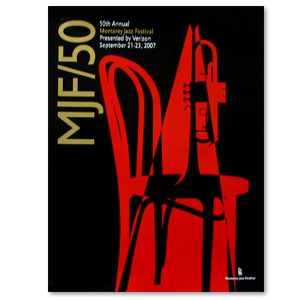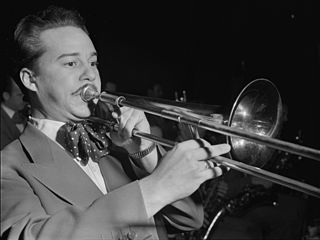
Charles Henry Christian was an American swing and jazz guitarist. He was among the first electric guitarists and was a key figure in the development of bebop and cool jazz. He gained national exposure as a member of the Benny Goodman Sextet and Orchestra from August 1939 to June 1941. His single-string technique, combined with amplification, helped bring the guitar out of the rhythm section and into the forefront as a solo instrument. For this, he is often credited with leading to the development of the lead guitar role in musical ensembles and bands.

Attilio Joseph "Teo" Macero was an American jazz record producer, saxophonist, and composer. He was a producer at Columbia Records for twenty years. Macero produced Miles Davis' Bitches Brew and Dave Brubeck's Time Out, two of the best-selling and most influential jazz albums of all time. Macero was known for his innovative use of editing and tape manipulation unprecedented in jazz and proving influential on subsequent fusion, experimental rock, electronica, post-punk, no wave, and acid jazz.
Jazz is a 2001 television documentary miniseries directed by Ken Burns. It was broadcast on PBS in 2001 and was nominated for an Emmy Award for Outstanding Documentary or Nonfiction Series. Its chronological and thematic episodes provided a history of jazz, emphasizing innovative composers and musicians and American history.

The Monterey Jazz Festival is an annual music festival that takes place in Monterey, California, United States. It debuted on October 3, 1958, championed by Dave Brubeck and co-founded by jazz and popular music critic Ralph J. Gleason and jazz disc jockey Jimmy Lyons.
"April in Paris" is a popular song composed by Vernon Duke with lyrics by Yip Harburg in 1932 for the Broadway musical Walk a Little Faster. The original 1933 hit was performed by Freddy Martin, and the 1952 remake was by the Sauter-Finegan Orchestra, whose version made the Cashbox Top 50. Composer Alec Wilder writes, "There are no two ways about it: this is a perfect theater song. If that sounds too reverent, then I'll reduce the praise to 'perfectly wonderful,' or else say that if it's not perfect, show me why it isn't."

George Mesrop Avakian was an American record producer, artist manager, writer, educator and executive. Best known for his work from 1939 to the early 1960s at Decca Records, Columbia Records, World Pacific Records, Warner Bros. Records, and RCA Records, he was a major force in the expansion and development of the U.S. recording industry. Avakian functioned as an independent producer and manager from the 1960s to the early 2000s and worked with artists such as Louis Armstrong, Miles Davis, Duke Ellington, Benny Goodman, Dave Brubeck, Eddie Condon, Keith Jarrett, Erroll Garner, Buck Clayton, Sonny Rollins, Paul Desmond, Edith Piaf, Bob Newhart, Johnny Mathis, John Cage, Alan Hovhaness, Ravi Shankar, and many other notable jazz musicians and composers.

Edward Joseph Bertolatus, also known as Eddie Bert, was an American jazz trombonist.
The Metronome All-Stars were a collection of jazz musicians assembled for studio recordings by Metronome Magazine, based on its readers' polls. The studio sessions were held in the years 1939–42, 1946–53, and 1956, and typically consisted of two tracks which allowed each participant a chance to solo for one chorus. Earlier recordings feature more swing style, while the later sessions tend more toward bebop.
Michael Brooks was a British-born music historian, archivist, consultant, and producer.
Chronological Classics was a French compact disc reissue label. Gilles Pétard, the original owner, intended to release the complete master takes of all jazz and swing recordings that were issued on 78 rpm. By the time the label suspended operations in July 2008, its scope had extended to LPs.
The Hampton Jazz Festival is a major musical event started in 1968, and features many of the world's major jazz artists. It is held during the last full weekend in June each year, with the primary venue being Hampton, Virginia's Hampton Coliseum. Festival organizers describe it as "the best available jazz, R&B and blues artists that are on tour during the time of the festival... packaged at a reasonable price." In 2024 it was re-branded as the Hampton Jazz & Music Festival, with an emphasis on a broader range of musical acts.

By the end of the 1940s, the nervous energy and tension of bebop was replaced with a tendency towards calm and smoothness, with the sounds of cool jazz, which favoured long, linear melodic lines. It emerged in New York City, as a result of the mixture of the styles of predominantly white swing jazz musicians and predominantly black bebop musicians, and it dominated jazz in the first half of the 1950s. The starting point were a series of singles on Capitol Records in 1949 and 1950 of a nonet led by trumpeter Miles Davis, collected and released first on a ten-inch and later a twelve-inch as the Birth of the Cool. Cool jazz recordings by Chet Baker, Dave Brubeck, Bill Evans, Gil Evans, Stan Getz and the Modern Jazz Quartet usually have a "lighter" sound which avoided the aggressive tempos and harmonic abstraction of bebop. Cool jazz later became strongly identified with the West Coast jazz scene, but also had a particular resonance in Europe, especially Scandinavia, with emergence of such major figures as baritone saxophonist Lars Gullin and pianist Bengt Hallberg. The theoretical underpinnings of cool jazz were set out by the blind Chicago pianist Lennie Tristano, and its influence stretches into such later developments as Bossa nova, modal jazz, and even free jazz. See also the list of cool jazz and West Coast musicians for further detail.

JAZZ: The Smithsonian Anthology is a six-CD, box-set released by Smithsonian Folkways that covers the history of jazz. The set includes 111 tracks with representative works from many styles, including big band, dixieland, free jazz, fusion, Latin jazz, swing, and smooth jazz. An accompanying 200-page book includes essays, analysis, and photographs.

The Smithsonian Collection of Classic Jazz is a six-LP box set released in 1973 by the Smithsonian Institution. Compiled by jazz critic, scholar, and historian Martin Williams, the album included tracks from over a dozen record labels spanning several decades and genres of American jazz, from ragtime and big band to post-bop and free jazz.
This Is Jazz is a mid-priced series of jazz albums issued by Legacy Recordings from 1996 to 1998 in association with the Columbia and Epic divisions of Sony Music Entertainment. Each album features a different artist from the Columbia/Epic stable. Each album is titled This Is Jazz followed by the number in the series.
The Big Band and Jazz Hall of Fame is part of a US-based non-profit organization that began operations in 1978 and continues to the present (2022) in San Diego County, California. David Larkin is current president.

Playboy's 40th Anniversary: Four Decades of Jazz 1953–1993 is a 1993 box set, which was released to commemorate the 40th anniversary of Playboy magazine and its long association with jazz music.
This is the discography of Mosaic Records the American jazz record company and label established in 1982 by Michael Cuscuna and Charlie Lourie. Over three decades the jazz press and general publications have recognized Mosaic, with The New York Times naming it "the most distinctive reissue label in jazz", All About Jazz calling the company "arguably the premiere reissue label in jazz", and Esquire suggesting it is "America's most obsessive jazz label".








